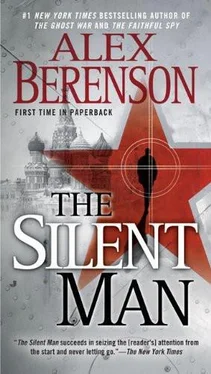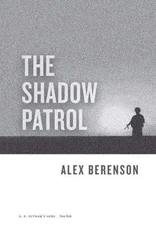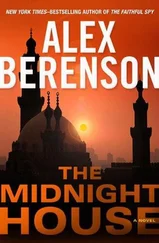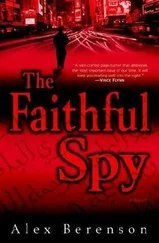Alex Berenson - The Silent Man
Здесь есть возможность читать онлайн «Alex Berenson - The Silent Man» весь текст электронной книги совершенно бесплатно (целиком полную версию без сокращений). В некоторых случаях можно слушать аудио, скачать через торрент в формате fb2 и присутствует краткое содержание. Жанр: Шпионский детектив, на английском языке. Описание произведения, (предисловие) а так же отзывы посетителей доступны на портале библиотеки ЛибКат.
- Название:The Silent Man
- Автор:
- Жанр:
- Год:неизвестен
- ISBN:нет данных
- Рейтинг книги:5 / 5. Голосов: 1
-
Избранное:Добавить в избранное
- Отзывы:
-
Ваша оценка:
- 100
- 1
- 2
- 3
- 4
- 5
The Silent Man: краткое содержание, описание и аннотация
Предлагаем к чтению аннотацию, описание, краткое содержание или предисловие (зависит от того, что написал сам автор книги «The Silent Man»). Если вы не нашли необходимую информацию о книге — напишите в комментариях, мы постараемся отыскать её.
The Silent Man — читать онлайн бесплатно полную книгу (весь текст) целиком
Ниже представлен текст книги, разбитый по страницам. Система сохранения места последней прочитанной страницы, позволяет с удобством читать онлайн бесплатно книгу «The Silent Man», без необходимости каждый раз заново искать на чём Вы остановились. Поставьте закладку, и сможете в любой момент перейти на страницу, на которой закончили чтение.
Интервал:
Закладка:
Inside the cab Nepetrov tried to get his bearings. Still alive, though he couldn’t understand how. His seat belt had saved him. That crazy farmer on his tractor. Why hadn’t he moved? No matter. Now. he needed to get out. He reached for the belt. But his arms weren’t working. In fact, as he looked at his right wrist he saw a bone poking through his skin. Though it didn’t hurt, didn’t bother him at all. What about his legs? He tried to wriggle in his seat, but he couldn’t move. Caged like a chicken. A chicken on the way to the slaughterhouse.
Bang! The cab jolted forward as the tanker hit it. “No,” Nepetrov whispered.
The tanker didn’t have an automatic fire protection system or the other safety equipment standard on its cousins in Western Europe and the United States. It was a Molotov cocktail on sixteen wheels. Now it was lit.
Hanging from the seat, coughing blood, awaiting the inevitable, Nepetrov began to sing. “There is only a small black ship with glistening white sails—”
Behind him, the tanker blew up, over sixty thousand pounds of gasoline. The blast wave swallowed Nepetrov and his next verse forever, tearing him apart instantly, or as close to instantly as possible, a death merciless and merciful at once. He never knew he’d been part of anything but a freak accident.
A TIGER, a Russian Humvee painted camouflage green, led the convoy. Two uniformed men sat in front, faces tense, breath visible in the cold. A BTR-80, an armored personnel carrier, followed the Tiger. The BTR was wide and tall, with eight oversized wheels and an angled front deck to deflect rocket-propelled grenades.
Then a truck, a Ural 4320 with a special cargo compartment, its walls made of inch-thick steel. Two men shivered inside the unheated cargo hold, their AK-47s held loosely at their sides. Beside the men, two big steel boxes lay on either side of the hold, twenty-four feet long, four feet high and nearly as wide. Chains connected the boxes to the floor of the truck. Each box held a short-range SS-26 missile, called the Iskander by the Russian army, a nuclear-tipped weapon with a range of about three hundred miles.
During transport, the Iskander’s nuclear bomb was removed and boxed separately, in a steel case about the size of a small trunk. The cases were carried alongside the missiles in the cargo hold. The warheads they held were the most precious and destructive treasure ever created, weighing just three hundred pounds but with the power to tear the heart out of a city.
The men in the back of the Ural knew that the warheads were engineered to be impervious to fires, earthquakes, meteorites, and everything else the universe might throw at them. If terrorists put a bomb under the road and blew a hole in the Ural’s cargo compartment, the explosion might kill the soldiers. But the warheads would not go off, not without first being armed — a procedure that required codes that no one on this convoy had. The safeguards were as close to perfect as human beings could devise. In the two generations since the United States detonated the first nuclear weapon, nations around the world had conducted hundreds of nuclear tests. But no bomb had ever exploded by accident.
And still, as they sat shivering under the fluorescent lights of the hold, the men wondered: How would it feel? If a dozen somethings went wrong, and the trillion-to-one odds came to pass? If one of the warheads blew, exploding with the power of 200 kilotons of explosive? Two hundred kilotons. 200,000 tons. 440,000,000 pounds. Exploding not ten feet from where they sat. How would it feel? What would they feel? The answer, they knew, was that they would most likely feel nothing at all.
But somehow that fact provided little comfort.
BEHIND THE URAL, the convoy continued.
Another Ural. Another Tiger. Two more Urals. Finally a second BTR and two final Tigers. Ten vehicles in all, carrying forty men and eight missiles. They rolled slowly, a concession to the weak winter light and the lousy road. The convoy’s commander, Major Yuri Akilev of the 12th GUMO, the military unit responsible for the security of Russia’s nuclear weapons, knew this route well. He had budgeted eight hours to cover the three hundred miles from Ishim to the Mayak nuclear plant, their destination. They’d made fine time until early afternoon, when the road ahead had filled with traffic. After a few minutes of waiting, Akilev sent up a sergeant to find out what had happened. The man reported that there’d been an accident ahead. A tanker truck was burning and blocking the road.
Akilev wasn’t surprised. Like many Russians, he saw life as a series of meaningless accidents laughed at, if not actually encouraged, by an angry God. But he wished the crash hadn’t happened on this stretch of highway, too narrow for him to turn his vehicles around.
For hours, he and his men waited, passing the time by cursing the drunkenness of Russian drivers, the foolishness of Russian engineers, and the ugliness of the local women. Akilev warned his men to remain alert, on the tiny chance that the accident was somehow a setup to block the road so terrorists could attack his convoy. But he wasn’t overly worried. His men were well-trained, and his BTRs were equipped with 14.5-millimeter machine guns that could stop anything short of a tank. If he truly needed help, he could get reinforcements by helicopter in two hours at most. He could defend himself for two hours.
Anyway, where would terrorists go even if they did manage to steal a bomb? The whole of the Russian army would be chasing them. In the last year, Akilev had led convoys down this road a dozen times, so often that his cargo almost seemed routine. Russia moved its nuclear weapons far more frequently than the United States did. The Russians had no choice. The chemical propellant that fueled their missiles was toxic, prone to corroding warhead shells. So Russia constantly needed to refurbish its arsenal, moving weapons from bases to the giant plant at Mayak, the heart of the Russian nuclear complex.
Yes, the trip almost seemed routine. But not quite. Akilev was always happy when he reached Mayak and his cargo became someone else’s problem.
Finally the tanker fire burned out and the local road crews roused themselves to clear the highway and free his trucks. The sun was already down by the time the convoy began moving again. Akilev had hoped to reach the Mayak plant by sunset. Instead, he and his men would ride well into the night. They had to move slowly after dark. The highway was unlit and they couldn’t chance an accident.
Akilev would rather have stopped for the night, but he had no choice. There were no bases between here and Mayak. Anyway, the convoy was due by midnight. Never mind that the plant would effectively be closed by then. The convoy was due, and as long as it arrived by 11:59 p.m., Akilev would get credit for a job well done. If he crossed the gate at Mayak at 12:01 a.m., on the other hand. Akilev shook his head. No one had ever accused the Russian army of having sensible rules.
GRIGORY FARZADOV SAT in his decrepit kitchen, sipping peach brandy from a chipped glass, watching the LCD timer on his microwave count down toward zero. He wore no pants or shirt, only gray underwear that billowed around his giant haunches. The temperature outside had fallen close to zero, but a film of sweat covered his belly and legs.
Grigory was a hulking shambles of a man, a cross between Frankenstein and Mr. Potato Head, with big soft hands and pitted skin. He’d never been married or had a girlfriend. He’d never even had sex without having to pay for it. He had been cursed with a fine mind and a fiercely ugly body. He wished every day for the reverse, but the choice wasn’t his to make. Fate made fools of men. He’d been born alone, and he’d surely die alone.
Читать дальшеИнтервал:
Закладка:
Похожие книги на «The Silent Man»
Представляем Вашему вниманию похожие книги на «The Silent Man» списком для выбора. Мы отобрали схожую по названию и смыслу литературу в надежде предоставить читателям больше вариантов отыскать новые, интересные, ещё непрочитанные произведения.
Обсуждение, отзывы о книге «The Silent Man» и просто собственные мнения читателей. Оставьте ваши комментарии, напишите, что Вы думаете о произведении, его смысле или главных героях. Укажите что конкретно понравилось, а что нет, и почему Вы так считаете.












